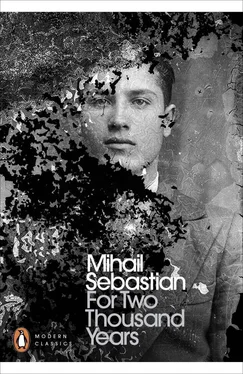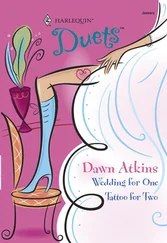I foolishly asked her this, just like I’d ask her if by any chance she had a headache. She answered with a shrug.
‘I don’t know what you mean. I have my moments of melancholy, of course. When you’re irritable, or when I love you too much or, well, when something bad happens to me, whatever that may be.’
The fact is, Marga is a woman before she is a Jew. And if the destiny of the race compels her towards insecurity and uncertain dreams, her destiny as a woman — which is more powerful — returns her to the earth and binds her to it, returns her to the laws of life, which are silent in her, in expectation of moving onwards, through childbearing. It’s a physical calm, and it expresses itself daily through a powerful sense of practicality, a sense of preparedness and expectation.
I re-read what I wrote above and laugh. Dear girl! What is left of you, of your warm laughter, of your good unhurried kisses, of the arms you lazily wrap around my neck, what is left of you in this writing that complicates you, comments on you, changes you?
She has a receptive sensibility, is obedient and well behaved, and she struggles to suppress her tremors beneath the virginity she defends against both herself and me. I know her body, suffering in expectation, I know the line of her hips curving so lazily, with such melancholy, beneath her dress.
No, there are no big questions. It is the small certainties that concern her and are illuminated in her presence.
The lines written in recent days about Marga concerning what I ironically call ‘big questions’ are unutterably mediocre. If I had not once and for all decided to stop being foolish, I’d rip up the page. But keeping a diary would be too easy a job if you could modify it afterwards, correcting what was misconceived in the first instance. You can’t correct without dissimulating. And that’s not what I want.
But I was humiliated with the shame of it, cringing at the limitations of those thoughts, at their triteness and complacency, I was ashamed yesterday evening in the street when, turning a corner, I found myself in the middle of a revolution. I don’t know exactly what had happened. There had been a local meeting of workers and in the end the police intervened. People didn’t want to vacate the hall, or vacated it too slowly, or somebody shouted out some revolutionary nonsense and then the confrontation began. I arrived too late to see the fight in full swing — and I wouldn’t have seen much anyway, as the struggle occurred inside, in the hall, and the exits were too few and too narrow for those packed inside to escape.
Now it was almost over. Most of them were being escorted away between bayonets, tattered and torn. Several were stretched out on the footpath, bleeding. There was one who was groaning terribly, his head under a frozen pipe that was thawing and dripping slowly. I felt as if something within myself had been crushed underfoot. It wasn’t revolt or indignation, but a terrible sense of powerlessness in the face of pain, and I admit my first thought was that it was my tough luck to have been there, as I’d rather not have witnessed the unhappy scene, rather not have known it existed, seen it, heard it. But, once there, I couldn’t pass it by, it wasn’t possible, not because it’s not in me to be cowardly, but because I had an acute feeling that I would never have forgiven myself, that I would have crossed a personal boundary, there in secret, and never been able to go back.
I felt the need to make a gesture of solidarity with those unfortunates, to shout — I don’t know — ‘Long live the revolution!’ or ‘Down with the bourgeoisie!’ or ‘We want higher wages!’ or whatever it was I had to say in order to be beaten along with them, taken away with them — though, at the same time, I realized how laughable I was, how sentimental and philanthropic I was in my good intentions. I was utterly ridiculous there, with my little intellectual crisis, in the middle of the street, among people — the brawlers and the beaten — who amounted to something, had a cause, a calling. I felt alone, unarmed, useless, in a wave of life that was passing me by implacably, throwing me aside, and taking the others on forward with it.
I returned to my empty room, my drawing boards of no interest to me, my meaningless books. Tomorrow or the day after I will recover my foolish pride at being solitary. And will again be an intellectual, a pen pusher.
*
The joy of being at the heart of the crowd, like a tree in the sleeping greatness of the forest, the feeling of partaking and participating in the great chain of life, by which you are transcended and absorbed into the wider, inchoate physical current of the species …
This is something I have never known and never will. ‘Me’. Everything I do, all I think, all I suffer is circumscribed: ‘Me’. And I have the deplorable audacity to be proud of this infirmity, to consider the window from which I view the world as a ‘vantage point’ rather than a mere refuge. The audacity to believe that my solitude is a principle, when it is only an inability.
How poorly, how pathetically I confess this sin — and for all that it is no less real. I am a tree that has fled the forest. A tree with pride — a disease which does not kill violently, but attacks patiently from below, at the roots, at the very foundation of life.
Yesterday’s events, which caught me unawares and left me baffled, demonstrate starkly the sad state of the class of people who call themselves intellectuals, to whom I belong. Strange perversion: to stand by the roadside watching those who pass and events, and from this drama — which excludes you, the spectator — to arrive at ‘ideas’, which you neatly record. To call this ‘the conflict between thought and action’ would be to be too kind to myself, as if we were talking about two separate, incompatible domains, each with its own validity. But this misrepresents the real problem — making it too abstract and easy on myself. The real problem is the intellectual’s inaptitude for real life, methodically cultivated through reading, thinking and dialectic. It is deformity by stages, a systematic habituation, day by day, a slow atrophying of the reflexes and instincts, a step-by-step destruction of the natural vital power that allows us to pass untroubled through storms.
I don’t believe any intellectual has ever done anything decisive in human history, when it was not a matter of culture but of actually saving the species. History should be re-examined from this perspective: I’d be surprised if I were mistaken. What can you do with such houseplants that wither in fresh air?
And the situation of the Jewish intellectual is certainly worse, as he stands at two removes from the active game of existence; firstly as an intellectual and secondly as a Jew.
I was reading in Şapsă Zwi’s history, sold to me in December by Abraham Sulitzer, my friend from the train, that in 1646 tens of thousands of Jews were butchered in Poland and Russia, hundreds of villages and towns were wiped from the face of the earth, and while the towns were burning, while the spilled blood was pouring like lava from a still active volcano, in the synagogues, among flames and blood, they discoursed over Talmudic texts.
And the historian relates this terrible thing with pride, as a heroic fact, while it seems to me a sinister refusal to live, the undermining of the vital impulses, a shameful retreat from the law of nature.
*
I couldn’t have bumped into Sami Winkler at a better moment. ‘Just the man I need,’ he said cheerfully. I’d recognized from afar his great square boxer’s shoulders in the corner at the National, where he’d stopped to pass the time. I hadn’t seen him since early December, on the day I went to the student dormitories and found him arguing with S. T. Haim, his ideological enemy.
Читать дальше












